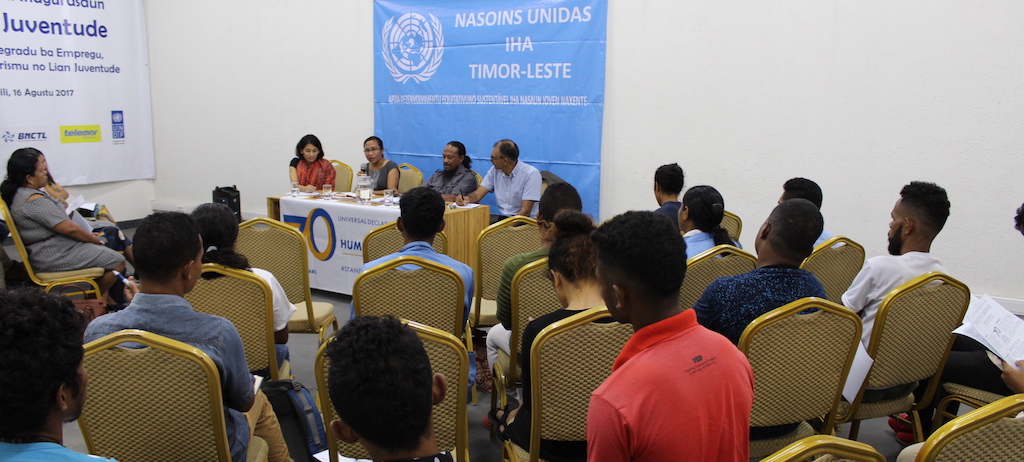Welcome to tonight’s discussion on human rights. The aim of these Dada Lia sessions is to enable media professionals in Timor-Leste to get more detailed information about a specific topic. This aims to improve media reporting and coverage of development and humanitarian issues.
I am delighted that we have a number of speakers this evening who have been dedicating themselves for many years to promoting and protecting human rights in Timor-Leste and globally.
We welcome the new Timor-Leste Provedora, Jesuina Maria Ferreira Gomes.
The Office of the Provedora for Human Rights and Justice, covers both human rights and good governance. It does human rights monitoring, helps with reporting to the United Nations and the Human Rights Council, as well as informing people about human rights and investigating human rights issues.
And we welcome Manuel Monteiro from the HAK Association. HAK stands for Law, Basic Rights, and Justice. HAK is a non-government organization in Timor-Leste that works to create a democratic and prosperous society in order to achieve social justice based on Human Rights principles.
As many of you may know, the global human rights agenda was set just after World War II. It was then that UN General Assembly adopted the Universal Declaration of Human Rights. Over the past decades, all UN Member States have re-confirmed that human rights are for all, no matter who you are and where you live. There are 30 Articles in the Universal Declaration of Human Rights, things like freedom of expression and association, freedom from torture and arbitrary arrest, and the right to marry, own property and right to a decent job. In December (next month), we celebrate the 70th anniversary of this Declaration of Human Rights.
Governments and state institutions have a vital role to play in securing human rights. State institutions are the primary ‘duty bearers’ to ensure t hat citizens can exercise their rights. But equally citizens also have responsibilities which include uphold the rule of law and treating other people with respect. Human Rights underpins the basis of the development and humanitarian work of organizations like the UN.
The call to respect for human rights is not new to Timor-Leste. The struggle for independence was a struggle for human rights.
Journalists often reports stories that are about human rights which helps society understand and claim its rights, but it also sometimes puts you at risk. We can think of the murder just a little over a month ago, in the Saudi Embassy in Turkey, of the Washington Post Journalist Jamal Kashoggi.
Jamal was like many journalists, seeking to hold people in authority to account, through his own independence, impartiality, objectivity, commitment to accuracy and fairness. On 2 November every year, the world commemorates the international day to end impunity for crimes against journalists.
I mentioned that development and rights are interlinked. When you report on the poor state of schools in a municipality, you are writing about the very important right to education – a right that is so fundamental as it is a must for one to be able to exercise other rights, like the right to work, to take part in governance and to live a decent live.
Generally Timor-Leste has an enviable reputation for its commitment to Human Rights, I am glad to see the wide freedom of the press in Timor-Leste. But we need to protect and nurture the environment which ensures a commitment to basic human rights for everyone regardless of whether their age, gender, sexual orientation, (dis)abilities or where they live.
As we start the 16 days of Activism, I hope tonight’s conversation enables each of us to reflect on global trends and the ways that some of the human rights are being violated or neglected. This year the 16 Days of Activism aims to Stop Violence against women and girls. It is an important global issue that has affects the lives of individuals, families, communities and nations. It affects education outcomes, productivity and stops people achieving their potential.
I am looking forward to tonight’s conversation with you about human rights and how we can all work to improve the lives of all people in Timor-Leste.
